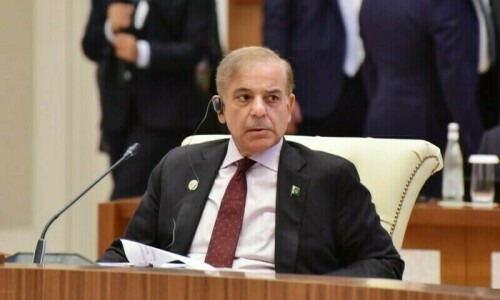KARACHI, Feb 6: Concerned about political instability and terrorism in Pakistan, the European Union is stressing the need for restoration of democracy for viable relations with the country.
This was stated by Dr Moonis Ahmar, chairman of the International Relations department of Karachi University, while responding to a question during his lecture on “EU-Asia Relations: Problems and Prospects; Focus on China, India and Pakistan,” at the Area Study Centre for Europe on Wednesday.
Dr Ahmar said that the European Union wanted stability in democratic institutions, protection of human rights and holding of transparent elections in Pakistan to curb violence and terrorism, which discouraged foreign investment and affected economic relations.
The EU was not only a major trading partner but also an important foreign donor of aid for poverty alleviation, communication and infrastructural development and education. He said that the EU was quite conscious about the restoration of democracy, particularly with reference to transparent elections on Feb 18 in Pakistan.
However, he described the recent tour of President Musharraf to Europe as a flop. “It has backfired and the president has failed to deliver the message he was trying to give,” he said and added, “it was basically because of the tussle with (local) media, circulating material against the chief justice etc.”
He said that Asian countries should learn lessons from the European model of peace, conflict resolution, cooperation and stability to give priority to human development and achieve the objective of prosperity.
While examining the historical basis of EU-Asia relations, the problems and prospects, Dr Ahmar said that there were some structural problems though with the growth of Asian economies, one could expect building of viable partnership in economic, political, strategic and security areas. The 1994 strategy paper of the EU suggested effective and proactive presence of Europe in Asian countries. The EU is not only providing a substantial amount of humanitarian assistance to Asia but has adopted 18 individual country strategies and a regional strategy, covering cooperation with Asia for a period from 2007 to 2013. Now the foremost requirement was a better sense of understanding of Asia about Europe and the vice-versa, he added.
Barriers in progress
Describing corruption as an irritating barrier in Asia’s prosperity, he said that several Asian countries, including Pakistan, were beneficiaries of the funding from the European Union to eradicate poverty, maintaining rule of law, run literacy and health programmes, yet they were not yielding required results just because of corruption.
He also stressed that conflict resolution was badly needed in the continent and Asian nations that felt their national interests being compromised by relinquishing sovereignty needed to see the EU as an example. He said that the EU was formed only when nations like French and Germans relinquished their sovereignty despite being nationalists to the core and fighting wars in the past.
Asian nations were pitted against each other and as a result of which the continent could not have a viable core. Though China, India and some Asean countries had emerging economies, none could be considered as a viable core because each of them had its own domestic issues, he said, adding that peace was attainable and efforts could be made for a ‘United Asia’ by relinquishing sovereignty.
As a result of change in the global power structure, he said, one could expect growing cooperation between the EU and major Asian countries like China, South Korea, India and the Asean members.
Earlier, ASCE Director Prof (Dr) Naveed Ahmad Tahir welcomed the professor.













































